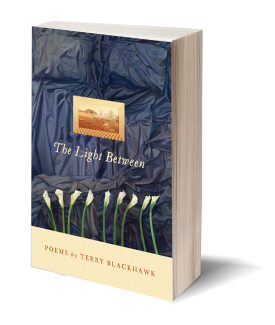The Light BetweenBy Terry Blackhawk
Wayne State University Press |
 |
|---|
Reviewed by Caroline Maun
The epigraph to Terry Blackhawk's The Light Between is Emily Dickinson's line "Split the Lark—and you'll find the Music—." Dickinson's poem derides the "skeptic Thomas" for his "Scarlet Experiment"; somehow the point of beauty and life is lost in the desire to get at the source of its magic. The constellation of forces and organs that comprise the lark do not add up to its song—it must remain integrated and living to sing.
The Light Between is a meditation on the disintegrating effects of pain and the healing of integrated being. Blackhawk marshals all of her senses to document the pain of a wife shattered by the end of her marriage, and must force herself to find ways to move forward, recognizing what life continues to offer in beauty and humor.
The painting on the cover of The Light Between, La Santa E Gloriosa Carne, by Detroit artist Ed Fraga, is also the source of the book's first, ekphrastic poem, "A Peaceable Kingdom." In Fraga's painting, a surreal dreamscape is placed postcard-like and sere in the center, and the desiccated scene of a broken wasteland simultaneously represents the past, present, and future of the relationship. Blackhawk says, "This dream is too dry: / it takes moistness to survive / the night . . ." The marriage bed, built for two but occupied by one, is the tomb of the relationship, and the peaks and valleys of the bedclothes represent the rocky emotional landscape they endured. Blackhawk's persona's curse: "Let this emptiness / be your permanent bed."
To express her pain Blackhawk braids rage, myth, and a smoldering language of desire in "Medea—Garland of Fire." Most readers will instantly think of Euripides's Medea, whose revenge included filicide, but Blackhawk works with a variant of the story where the children are not killed, although the persona does wish momentarily that they had never been born. Blackhawk's Medea is a sorceress, able to draw potions from the natural world around her, knowing the secret strategies that Jason must employ to succeed. Her revenge at his betrayal is directed at the other woman, to whom she will send an irresistible, poisoned garment that will "brand into her brow a flame / erasing father, kingdom, name."
We are led to believe the poem "I think of my ex-husband standing in sunlight" will be a sentimental remembrance by its title, but it is instead a revision of "The Frog Prince," the Grimm tale of transformation and love where a relationship is summoned instantly to life by the venture of a kiss. Dangling a taxidermy tree frog by his hand, Blackhawk spins him around and notices that he has been frozen physically and in time—"Decay would not have left him so fixed / and exact, like a paper lantern." The associations mount between the frozen frog, her now-frozen relationship, and her ex-husband: "[a] thoroughgoing freeze must have caught / him thus, midstride." She sees that the frog is transparent when held to the light, all systems utterly stalled: "he became his shell." For Blackhawk, who has continued to grow and heal, this poem is a quiet renunciation, tempered by ironic humor, of any hope of revivifying the marriage.
Marriage is reimagined in "Marriage Poem" as part of a chain of relationships that go forward through time and that exceed the lifetimes of individuals. The poem is a blessing for the persona's son and future daughter-in-law, commemorating specific details of their love story. Blackhawk offers her daughter-in-law a lily, perhaps from Fraga's painting: "you are that lady, the woman / who carries her lily like a torch." This love "teach[es] us how / we may inhabit any point in time, doubly / and equally." Her son, his wife, and their future become "the center of the circles / described by two great Redtails . . . their soaring / connectedness, and the light between them."
Blackhawk's song in The Light Between moves toward re-integration of the self after the fracturing personal and social loss of divorce. The poet must live in order to sing, and her song creates growth and leads to meaning within the broken landscape. Through her poetry, Blackhawk practices a meditative and viable way forward.
